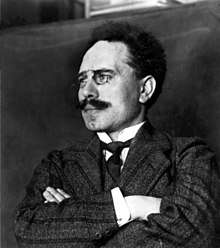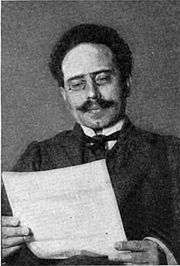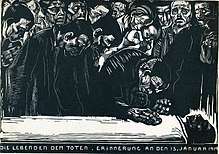Karl Liebknecht
Karl Paul August Friedrich Liebknecht (German: [ˈliːpknɛçt] (![]()
Karl Liebknecht | |
|---|---|
 | |
| Member of the Reichstag | |
| In office 1912–1918 | |
| Personal details | |
| Born | 13 August 1871 Leipzig, Kingdom of Saxony, German Empire |
| Died | 15 January 1919 (aged 47) Berlin, Germany |
| Citizenship | German |
| Nationality | German |
| Political party |
|
| Spouse(s) | Julia Paradies (m. 1900; died 1911) Sophie Liebknecht (m. 1914) |
| Relations | Wilhelm Liebknecht (father) Natalie Liebknecht (mother) |
| Alma mater | Humboldt University of Berlin |
| Occupation | Lawyer Politician Revolutionary |
After their deaths, Liebknecht and Luxemburg became martyrs for socialists. According to the Federal Office for the Protection of the Constitution, commemoration of Liebknecht and Luxemburg continues to play an important role among the German left, including Die Linke.
Life and career
Early life
Liebknecht was born in Leipzig, Saxony, Germany, the son of Wilhelm Martin Philipp Christian Ludwig Liebknecht and his second wife Natalie (née Reh), who also came from a family with a strong political background as her father Theodor was a member of the Frankfurt Parliament of 1848.[1] Liebknecht's parents were second cousins as his maternal great-grandmother was the sister of one of his paternal great-grandfathers.[2]
His father was a co-founder with August Bebel of the Marxist Social Democratic Party of Germany (SPD). Liebknecht became an exponent of Marxist ideas during his study of law and political economy in Leipzig and Humboldt University of Berlin. After serving with the Imperial Pioneer Guards in Potsdam from 1893 to 1894 and internships in Arnsberg and Paderborn from 1894 to 1898, he earned his doctorate at Würzburg in 1897 and moved to Berlin in 1899, where he opened a lawyer's office with his brother, Theodor and Oskar Cohn.[3] Liebknecht married Julia Paradies on 8 May 1900. The couple had two sons and a daughter before Julia died in 1911.[4]
Political career

As a lawyer, Liebknecht often defended other left-wing socialists who were tried for offences such as smuggling socialist propaganda into Russia, a task in which he was also involved. He became a member of the SPD in 1900 and was president of the Socialist Youth International from 1907 to 1910. Liebknecht also wrote extensively against militarism. In his speech at the Bremen party conference in 1904, he insisted to his audience: "Militarism is our most deadly enemy and the best way of waging the struggle against it is to increase the number of social democrats among the soldiers".[5] One of his papers, Militarismus und Antimilitarismus (Militarism and Antimilitarism) led to his being arrested in 1907 and imprisoned for eighteen months in Glatz, Prussian Silesia. In the next year, he was elected to the Prussian parliament despite still being in prison.[6]
Liebknecht was an active member of the Second International and a founder of the Socialist Youth International. In 1912, Liebknecht was elected to the Reichstag as a Social-Democrat, a member of the SPD's left-wing. In October that year, he married his second wife, art historian Sophie Ryss.[6] He opposed Germany's participation in World War I, but in order not to infringe the party's unity he abstained from the vote on war loans on 4 August 1914.[7] On 2 December 1914, he was the only member of the Reichstag to vote against further loans, the supporters of which included 110 of his own party members. He continued to be a major critic of the Social-Democratic leadership under Karl Kautsky and its decision to acquiesce in going to war.
At the end of 1914, Liebknecht, together with Rosa Luxemburg, Leo Jogiches, Paul Levi, Ernest Meyer, Franz Mehring and Clara Zetkin, formed the so-called Spartacus League (Spartakusbund). The Spartacus League publicized its views in a newspaper titled Spartakusbriefe (Spartacus Letters) which was soon declared illegal. Liebknecht was arrested and sent to the eastern front during World War I despite his immunity as a member of parliament. Refusing to fight, he served burying the dead and due to his rapidly deteriorating health was allowed to return to Germany in October 1915.
Liebknecht was arrested again following a demonstration against the war in Berlin on 1 May 1916 that was organized by the Spartacus League and sentenced to two and a half years in jail for high treason,[8] which was later increased to four years and one month.
Revolution and death
_-_Liebknecht_2.jpg)
Liebknecht was released again in October 1918, when Prince Maximilian of Baden granted an amnesty to all political prisoners. Upon his return to Berlin on 23 October, he was escorted to the Soviet embassy by a crowd of workers.[9] Following the outbreak of the German Revolution, Liebknecht carried on his activities in the Spartacist League. He resumed leadership of the group together with Luxemburg and published its party organ, Die Rote Fahne (The Red Flag).
On 9 November, Liebknecht declared the formation of a Freie Sozialistische Republik (Free Socialist Republic) from a balcony of the Berliner Stadtschloss, two hours after Philipp Scheidemann's declaration of a German Republic from a balcony of the Reichstag.[10] On 31 December 1918 and 1 January 1919, Liebknecht was involved in the founding of the Communist Party of Germany (KPD).[11] Together with Luxemburg, Jogiches and Zetkin, Liebknecht was also instrumental in the January 1919 Spartacist uprising in Berlin. Initially, he and Luxemburg opposed the revolt, but they joined it after it had begun. The uprising was brutally opposed by the new German government under Friedrich Ebert with the help of the remnants of the Imperial German Army and militias called the Freikorps. By 13 January, the uprising had been extinguished. Liebknecht and Luxemburg were captured by Freikorps troops on 15 January 1919 and brought to the Eden Hotel in Berlin, where they were tortured and interrogated for several hours.[12] Following this, Luxemburg was beaten with rifle butts and afterwards shot and her corpse thrown into the Landwehr Canal while Liebknecht was forced to step out of the car in which he was being transported and was then shot in the back. Official declarations said he had been shot in an attempt to escape. Although the circumstances were disputed by the perpetrators at the time, the Freikorps commander, Captain Waldemar Pabst, later claimed: "I had them executed".[13]
Legacy

Clara Zetkin penned an obituary for Liebknecht in September 1919[14] and together with Rosa Luxemburg he became a celebrated martyr of the German left.[15] The artist Käthe Kollwitz depicted his lying in state in the work Memorial for Karl Liebknecht.[16] In 1930, the Soviet government renamed a village near Kursk in central Russia after him, Imeni Karla Libknekhta. Since 1919, an annual Liebknecht-Luxemburg Demonstration has been held in Berlin,[17] the world's largest funerary parade and the biggest meeting of the German left. The annual L-L Demo is held on the second Sunday in January to this day[18] and 14,000 people attended the rally in Liebknecht and Luxemburg's honor in 2016.[19]
See also
- Luxemburgism
- Karl Liebknecht (film)
- Ture Nerman
- Zeth Höglund
References
- Annelies Laschitza, Die Liebknechts: Karl und Sophie – Politik und Familie, Berlin: Aufbau Taschenbuch, 2009
- Trotnow, Helmut (1984). Karl Liebknecht (1871–1919): political biography. Archon Books. p. 16. ISBN 0208020330.
- Heid, Ludger; Benz, Wolfgang; Paucker, Arnold; Pulzer, Peter (1998). “Er ist ein Rätsel geblieben“. Oskar Cohn – Politiker, Parlamentarier, Poale Zionist. Jüdisches Leben in der Weimarer Republik (in German). Tübingen: Mohr Siebeck. p. 26. ISBN 3-16-146873-2.
-
- Helmut Trotnow, Karl Liebknecht, 1871–1919: A Political Biography, Olympic Marketing Corp, 1984, ISBN 978-0208020338
- Trotnow, Helmut (1984). Karl Liebknecht (1871–1919): A Political Biography. United States of America: Archon Books. pp. 55–56. ISBN 0-208-02033-0.
- Timeline of Karl Liebknecht's life (in German) at the Lebendiges Museum Online (LEMO).
- "Luxemburg und Liebknecht: Dauerfehde um einen Doppelmord". 2009 article from Der Spiegel (in German).
- "Unrest in Germany". The Argus. Melbourne. 4 July 1916. p. 7. Retrieved 29 November 2012 – via National Library of Australia.
- Nettl, J. P. (1969). Rosa Luxemburg (Abridged ed.). Oxford: Oxford University Press. pp. 439–440.
- H. Wohlgemuth, Karl Liebknecht, Dietz Verlag, 1975
- Ottokar Luban, The Role of the Spartacist Group after 9 November 1918 and the Formation of the KPD, in: Ralf Hoffrogge and Norman LaPorte (eds.), Weimar Communism as Mass Movement 1918–1933, London: Lawrence & Wishart, 2017, pp. 45–65.
- Bouton, Miles S. And the Kaiser Abdicates: The German Revolution 1914–1918. Yale University Press.
- Wette, Wolfram (2006). The Wehrmacht: History, Myth, Reality. Cambridge: Harvard University Press. p. 44. ISBN 0674022130.
- Clara Zetkin. "Karl Liebknecht" (in English).
- Sewell, Sara Ann (2009). "Mourning Comrades: Communist Funerary Rituals in Colonge during the Weimar Republic". German Studies Review. 32 (3): 527–548. JSTOR 40574865.
- Käthe Kollwitz. Ikon Gallery. 2017. Retrieved 26 November 2017.
- "Die Ermordung von Rosa Luxemburg und Karl Liebknecht".
- Information about the L-L Demo (in German).
- "Lenin-Liebknecht-Luxemburg 2016: Zehntausende beim Gedenken und 14.000 auf der Demonstration".
Further reading
- Timeline of Karl Liebknecht's life (in German), at the Lebendiges Museum Online.
- Helmut Trotnow, Karl Liebknecht, 1871–1919: A Political Biography, Olympic Marketing Corp, 1984, ISBN 978-0208020338.
- Emile Burns, Karl Liebknecht, London : Martin Lawrence, 1934.
- Karl Liebknecht, "The Future Belongs to the People" Leopold Classic Library, 2015.
- H. Wohlgemuth, Karl Liebknecht, Dietz Verlag, 1975.
- Annelies Laschitza, Die Liebknechts: Karl und Sophie – Politik und Familie, Berlin: Aufbau Taschenbuch, 2009.
- Sara Ann Sewell, "Mourning Comrades: Communist Funerary Rituals in Colonge during the Weimar Republic", German Studies Review, 32(3) 2009, 527–548.
- Eric D. Weitz, Creating German Communism, 1890–1990: From Popular Protests to Socialist State. Princeton, New Jersey: Princeton University Press, 1997.
- Ottokar Luban, The Role of the Spartacist Group after 9 November 1918 and the Formation of the KPD, in: Ralf Hoffrogge and Norman LaPorte (eds.), Weimar Communism as Mass Movement 1918–1933, London: Lawrence & Wishart, 2017, pp. 45–65.
- Karl Liebknecht's works (in English) at the Marxists Internet Archive.
External links
| Wikimedia Commons has media related to Karl Liebknecht. |
- Karl Liebknecht at the Encyclopædia Britannica
- Works by Karl Liebknecht at Project Gutenberg
- Works by or about Karl Liebknecht at Internet Archive
- Karl Liebknecht Internet Archive. Marxists Internet Archive. Retrieved April 21, 2010.
- Newspaper clippings about Karl Liebknecht in the 20th Century Press Archives of the ZBW

- . Encyclopædia Britannica (12th ed.). 1922.
- Reynolds, Francis J., ed. (1921). . Collier's New Encyclopedia. New York: P. F. Collier & Son Company.
- "Liebknecht, Karl". Encyclopedia Americana. 1920.
